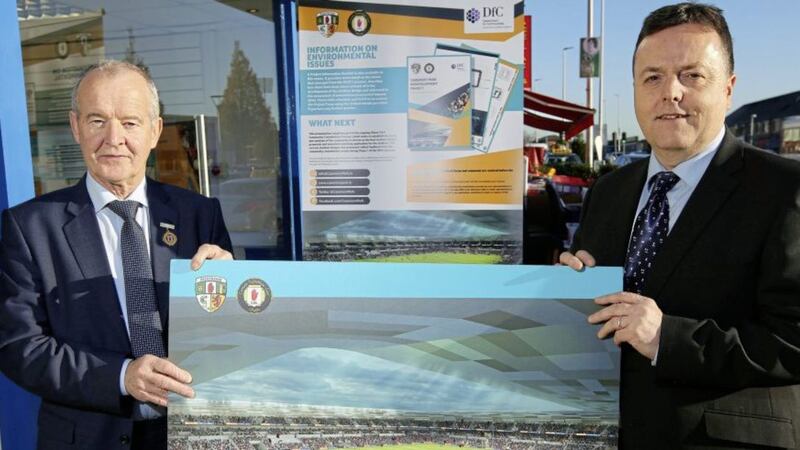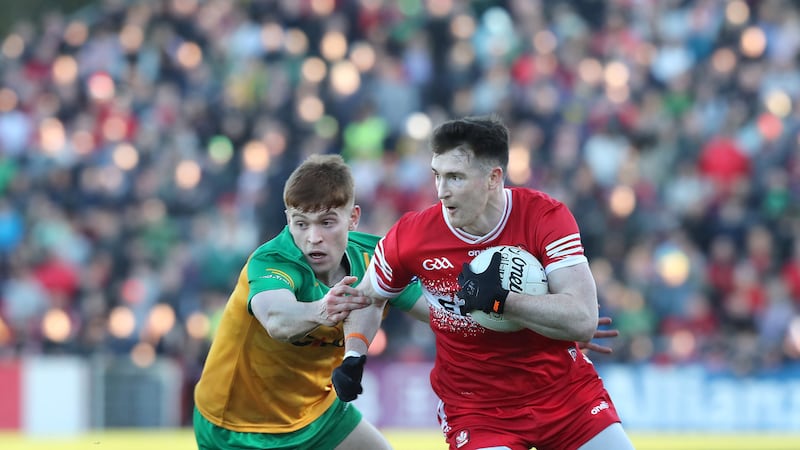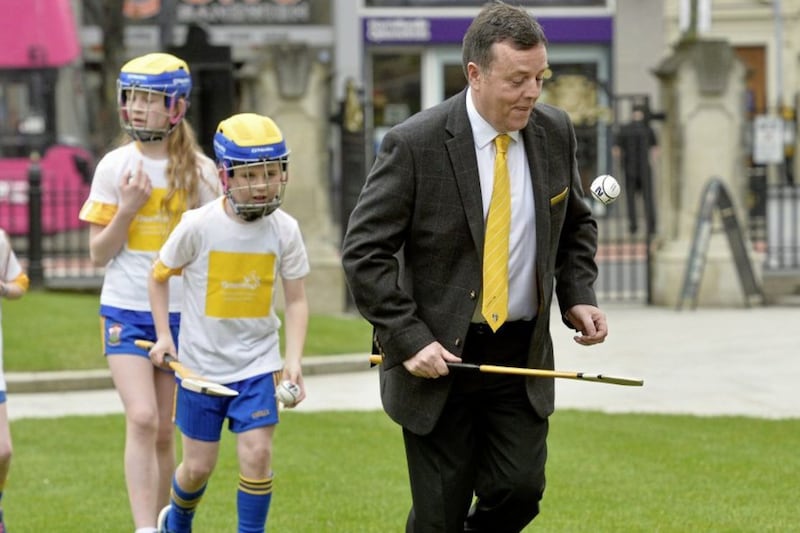With Antrim's county convention scheduled for Monday week, Saffron Vision county board members Collie Donnelly (chairman) and Terry Reilly (vice-chairman) face challenges for their positions. Brendan Crossan speaks to both men...
Brendan Crossan:You’ve been at the helm for two years. A criticism of the county board has been a lack of communication with the clubs…
Collie Donnelly [chairman]: I think the first thing that needs to be acknowledged is what we inherited wasn’t great. What people need to understand is it was like taking over a distressed business.
Six weeks into the job people on the executive committee had to put their hands in their pockets to pay salaries. Now, that’s not something you want to tell the world. So it was a very low base, no structures. No disrespect to what went before, but it was in poor shape.
BC: Was that not generally acknowledged by everybody?
Terry Reilly [vice-chairman]: It was far worse than you could imagine. It was very, very poor.
CD: When you’re trying to build or revive something we had to work out how we were going to do that. We tried to attract people.
Of course the first issue was finance, so we put together the Saffron Business Forum and I think people can see the success of that.
We have over 90 members that give £1,000 per year. Last year we had Bill Wolsey [Merchant Hotel owner and entrepreneur] for a breakfast morning.
We had the magnificent AP McCoy day – supported by over 500 people, and we had a terrific breakfast morning with Ciaran Barr. Within those rooms it was really encouraging to see the people who wanted to support Antrim from the corporate sector.
BC: When you became chairman you mentioned that Antrim’s sponsorship drives had to move beyond the generous contribution of the local chippies and Chinese takeaways. It seemed hand-to-mouth existence…
CD: That’s correct and those people were very good to Antrim. At that time every penny was a prisoner.
But if we’re going to move the project on we have to tap into the corporate sector and the Saffron Business Forum has managed to do that. They’ve done a power of work.
Our main sponsors have increased their sponsorship – Creagh Concrete and Northern Property. There’s more money for our championships too.
TR: And also the contribution from the Casement Park social club. They have raised £40k this year and £25k last year.
CD: So, from the financial side of things, we’re breathing new life into Antrim again.
BC: Relations with the Casement Park social club had broken down a few years back. What changed?
CD: We met people and I think we reached out to them. We convinced them that we seen the social club as part of Antrim GAA and an important element to our fundraising. And they have demonstrated that.
There is a good working relationship there and we see them as part of that going forward and being part of the new stadium.
TR: We were elected in the first week of December 2015 and on January 6 2016 the social club had their AGM. We attended that and we attended it on the basis that whatever went before we weren’t going to be critical of.
Going forward, we were going to try and repair the relationships with them.
We spelt out what we wanted to do and the important role of the social club in helping Antrim GAA. It was cagey at the start but Collie and I being west Belfast people, we understood a lot of the challenges; we knew a lot the personnel and the true Gaels in the social club.
That went a long way in them accepting us… They have been allies of Antrim GAA.
BC: Since taking charge two years ago would you do anything differently? The messages you hear is the lack of communication from the county board to the clubs…
CD: I think what we would do differently is concentrate on monthly newsletters and telling the public what we’re doing, through social media and using our website about the projects we’re involved in. But we haven’t done that particularly well.
BC: Would that quell dissent in the county?
CD: I think over the last few weeks we’ve been doing that. People have been saying to us: ‘We didn’t know the state we were in. We didn’t know the work that you were doing.’
So, we’ve learned from that. When we took it on, we were in the minus. At convention this year we will report a healthy turnaround.
BC: In some ways, Antrim GAA has been viewed as a bystander in the Casement Park project. How have you tried to involve Antrim Gaels in this process?
CD: We’ve been discussing different elements with the Ulster Council about the project. There were historical financial issues, which took a lot of time to sort out, and we reached a satisfactory conclusion to that just recently.
That took the best part of 18 months. There was Antrim’s status going forward and how Antrim will be fixed in this new world – and that is at the latter stages. Then, there was the social club.
BC: You say things are looking much brighter in Antrim. So why do you both face challenges at convention?
TR: We haven’t spelt this out. Our biggest strength is also our biggest weakness. We don’t throw flowers at ourselves and promote this.
But as convention will see, Antrim GAA is better off to the tune in excess of £200,000 per annum from private ventures that we have encouraged and attracted people to.
CD: In my experiences, when you’re in a position of leadership and making decisions, and when you’re trying to govern you can’t please everybody. We’ve tried to change structures, put governance in place, we’ve tried to change old habits – and that gets resistance.
We’re also involved in some delicate negotiations; very, very sensitive stuff, and you just can’t share that information with everyone. So there’s probably a little bit of: ‘Oh, they’re not sharing information with us.’ And I can understand that.
Some people think because they’re elected to a role they demand to know instead of concentrating on the role that they were elected to do. The reason why we’ve managed the progress is because of people like Terry and Pol Mac Cana because they have the skill sets to get the job done.
And that’s the only way Antrim will progress.
BC: Do you both feel deflated that there is a challenge to your positions so early in your roles?
TR: I feel it’s everybody’s democratic right under the processes we have for people to put themselves forward. I genuinely believe that.
But I feel let down that these people have not acknowledged where we are at.
The people that are running against us have been in office previously and they should understand the challenges and they should most certainly be in a better position than most to acknowledge the progress that we have overseen.
Now, you asked the question in relation to communication. There are very sensitive negotiations in and around Casement Park.
Now, I know James [McClean] in particular, who is running against Collie, felt outside of that loop.
But if you stop to think for a minute that if you share some of that information you are breaking people’s confidence… People sometimes don’t understand these sensitivities and it’s important that is contextualised.
BC: What was your feeling on facing a challenge for the chairmanship after two years?
CD: Everybody’s entitled to put their hand up, but my feeling would be - you’ve had your chance, you’ve done your time.
When we were elected we also reached out to some of those people. I can quote you an example of asking to be brought up to speed with the historical Casement Park stuff, with two senior people.
I drove from Dublin at 4pm to meet with two of these people at six o’clock before a management meeting at 7pm. And these two gentlemen walked in together at seven o’clock. So you think to yourself: ‘Why are you here? Are you really here to benefit Antrim?
TR: The people who are running now, if they would have come to us and said: ‘Lads, we see what you are doing, it’s very progressive for Antrim; it’s going to take us forward. We would like to inherit that and shadow you and come along with you.’
But I see it [the challenges] as trying to capitalise on the gains that we have made.
CD: The people who we have talked to said: ‘We will commit to Antrim but we need the right team in place.’
TR: For the Belfast Urban Plan, we had to have in place a Human Resources committee that would do the recruiting because the GAA would not commit huge funding [to Antrim]. We were able to get an employment law barrister, people from a business and legal backgrounds [on the committee].
Central Council sat down with us to see what we were doing and they said that we were way ahead of them. But we haven’t spread the good news.
BC: Did you realise how big the job was going to be?
CD: Because I come from a playing background the other [administration] stuff is just an extension of my job. It’s problem solving, it’s commerce… but you couldn’t do this job if you didn’t have support from Terry, Pol [Mac Cana, Treasurer] and the team because this is a million-pound business and it takes a bit of watching.
We’re running a business with no headquarters. People understate the fact that we’ve no home. We’re like nomads. The cost and the logistical work to run Antrim GAA are huge.
BC: Casement Park was closed much too early. Why was it closed?
CD: It was crazy. It must have been the worst decision in Antrim’s history. I have to say that. And in relation to the Casement Park project, if you were trying to do 10 things wrong they did them all.
BC: When do you see Casement Park being built?
CD: We are very hopeful that construction will start within the next year and we will be in Casement Park in 2020.
BC: What is the main obstacle?
CD: We’re hoping for planning at the end of the year and then there is a 90-day window for objections and hopefully this time the project board has been working on the safety elements. I’m quietly confident. We’re supporting everything for the stadium but at the same time Antrim GAA will have to be catered for.
BC: When is the £1.5m from Central Council for the Belfast Urban Plan going to be rolled out?
CD: We hope to be able to announce that at convention.
BC: How many coaches will this yield for Belfast?
CD: The top post is Urban Development manager and then there will be eight coaches in Belfast.
BC: How much of a difference do you think that will make?
CD: It’s a start. There is no quick fix. We are going to have sell Gaelic Games back into the primary schools. We now have additional resources and we have 4G facilities in Belfast that were funded by the council and the GAA.
The participation levels of Gaelic Games in Belfast are pretty low, so we’ve a big task ahead of us.
BC: If you both don’t get re-elected what’s the ramifications?
CD: I think it would be a backward step. We would still be Antrim men on Tuesday morning. We want Antrim to do well. We’re only on the project and we have a few things to finish off.
We are involved in Casement Park, the Belfast Urban Plan and the Saffron Business Forum. And there is also the Dunsilly project.
They handed us the keys… We were under pressure from the local council, so that was on our lap.
We managed to spend the best part of £60,000 to extend the car park to meet the planning [criteria]. We’ve also spent the best part of £25,000 to re-seed the pitches to bring them back to life. Floodlights are the next thing on our agenda at Dunsilly.
BC: You say all this: why are there contenders for your positions then?
TR: We inherited a lot… As far as our finances, you will see post-convention how healthy we are. Now, we haven’t been shouting that from the rooftops and that’s why people are challenging positions.
The other reason why we’re facing challenges is they see the kudos in the good work that’s being done.
I’m annoyed because I entered into this with people, Antrim Gaels, who had a bit about them, who had a bit of nous. I was asked to go along on this journey.
The people that are running for positions, I would like to know if they are willing to sacrifice half of their work lives every week – night and day…
I know the guys that are running for position can’t give the same sacrifice. If they were to succeed [at convention] – which I don’t think they will once the clubs know Antrim’s [financial] position – Antrim would be set back.
CD: They call us the Saffron Vision. I can see a new Casement Park, I can see Gaelic Games in Belfast improving and I can see our teams climbing the tables.
BC: In fairness to Gearoid Adams, he was aware of the perception that the hurlers were being treated better than the footballers. He didn’t agree with it and could’ve made capital out of it, but didn’t.
TR: Can I say, I wish we were in a better position to help them, financially. Our cash flow was always negative (it’s now positive) which meant we couldn’t afford things for Frank [Fitzsimons] and Gearoid. It was exactly the same with the hurlers.
We were coming from a very low base. Because there has been a massive turnaround doesn’t mean to say we’re making loads of money - it has been spent.
We are like pilots on a 747, pulling the plane out of a nosedive and the important bit about this is we need to level it out before it goes up. Our income is up massively. We have far better governance in the county.
We have a chartered accountant, making sure that everything is done correctly. Our good governance has been reciprocated by Croke Park.
BC: Could Frank Fiztsimons’ exit as senior football manager been handled better?
CD: In hindsight, we should have had more frank conversations with Frank.
The lads had asked for an extension [towards the end of the NFL] and we said we’d need to speak with county management.
TR: We decided we would carry out a review of our county football and our county hurling [teams]. We tasked two committees with carrying out reviews and they fed that information back to county committee.
The hurling review committee came back and recommended the group stays in situ. The Football review committee came back with their findings and recommended we go outside and look for somebody else.
Management committee ratified that position. Once that was the case, the following Monday I articulated that position to Frank and Gearoid.
BC: There was a deadline set August 13 for nominations and Frank was the only name that went forward…
TR: Our sub committee was tasked with going outside and finding nominations as well as seeking out interested parties.
The date for nominations closed on a specific date but they were tasked with seeking out people and if they weren’t satisfied they could go outside that.
That’s important to note that.








